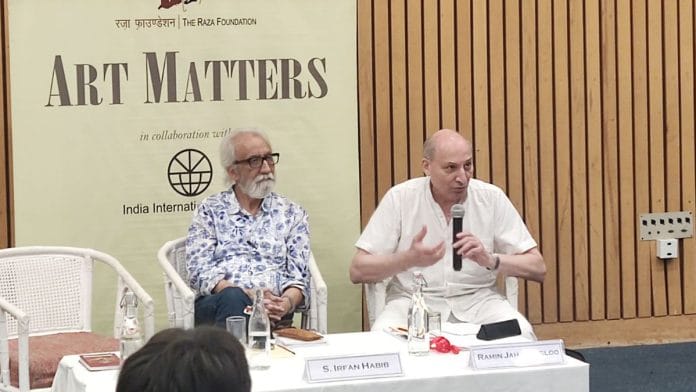New Delhi: Even before the book launch formally began, author Ramin Jahanbegloo declared in a one-on-one conversation with an audience member that writing in the 21st century is a sin. It set the tone for why he thinks Tagore is important enough to write a book on his ideas.
Jahanbegloo’s book, The Philosophy of Rabindranath Tagore: Thinking Across Cultures, gives space to Tagore’s classic poem, Where the mind is without fear. The author explores Tagore’s enduring relevance as a global thinker, examining his views on human nature, education, intercultural dialogue, nationalism, and nonviolence.
A mostly elderly audience of about 30 people waited patiently to hear Jahanbegloo and historian S Irfan Habib in a panel discussion about Tagore and the relevance of his universal humanist ideas in today’s world. The session, held at the India International Centre on 16 April, was moderated by Ashok Vajpeyi, poet and managing trustee of the Raza Foundation.
Jahanbegloo reminded the attendees of his old connection with Tagore. This isn’t his first book on the poet-philosopher. He wrote one in Persian 30 years ago while living in Iran, before getting imprisoned for four months on spying charges.
Each time he read Tagore, Jahanbegloo was surprised by the pertinence of his ideas.
“Several issues and topics on which he wrote, such as the toxic effect of religious fanaticism, which took me to prison actually, environmental awareness, the importance of civic education, intercultural dialogue, and a critique of nationalism and populism are pertinent today,” said the author.
The discussion also moved to Tagore’s global image and his political thought.
Habib recalled Jahanbegloo telling him that “Tagore is an internationalist, a cosmopolitan, why should we leave him for the Bengalis alone?”
As the Bengalis and non-Bengalis indulged in a round of laughter, Habib took the liberty to comment on the way Bengal remembers Tagore. “In Bengal, Tagore is remembered in parts. He is known for his Rabindrasangeet, his paintings, he is known for a few other little things, mostly art. But very few people talk about his politics. His idea of nationalism.”
The historian quoted Tagore, “India has never had a real sense of nationalism. Even though from childhood I had been taught that the idolatry of Nation is almost better than reverence for God and humanity, I believe I have outgrown that teaching, and it is my conviction that my countrymen will gain truly their India by fighting against that education which teaches them that a country is greater than the ideals of humanity.”
To this, there were a few claps and nods by a highly impressed audience member.
Also read: ‘Separation from son’. Artist Nehal Desai’s stunning lithography about melancholy
Outsider, border-crosser, visionary
Jahanbegloo presented two interesting terms to describe Tagore, “outsider” and “border crosser”. He said Tagore’s outsiderhood created in him an acute awareness of the world and a critical sense of resistance to all forms of political and intellectual dogmatism.
“But Tagore is an outsider who’s also a border-crosser,” the author said, adding that his “cultural border-crossing” should be considered not as a paradox of identity but as indicative of a complex cosmopolitan consciousness and an intellectual outsiderness.
On the sidelines of the event, Jahanbegloo told ThePrint that Tagore is personal to him as an Iranian.
“It’s not only academic interest, it’s also the fact that I am an Iranian and Tagore was very close to our culture. And mostly what we cherish as Iranians, of Tagore, is his poetry. But I think that his poetry is not separated from his music and other aspects of his art and his philosophy. So I wanted to show in this book that Tagore is a philosopher,” said the author.
“Despite the fact that he’s not a system builder like the German philosophers, he’s an important philosopher to read. And I think that future generations will discover new facets of Tagore,” he added.
Tagore was against “joyless education, based on rote learning of textbooks” and his ideas on education were never as relevant as they are today.
According to Jahanbegloo, “Tagore conceived an education system that would offer the individual the opportunity of the fullest self-development in harmony with nature and society.”
Habib went on to quote Tagore where he expresses his frustration over communal divides, “A country where only religion can unite people is doomed. The divisiveness such a country manufactures using religion is the most monstrous divisiveness of all.”
For Jahanbegloo, it was Tagore’s invitation to mankind “to come to its senses”.
(Edited by Aamaan Alam Khan)






